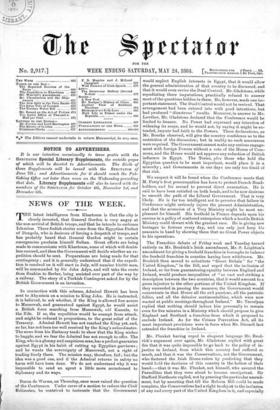Baron de Worms, on Thursday, once more raised the question
of the Conference. Under cover of a motion to reduce the Civil Estimates, he contrived to insinuate that the Government would neglect English interests in Egypt, that it would allow the general administration of that country to be discussed, and that it would even revive the Dual Control. Mr. Gladstone, while repudiating these imputations, practically refused to answer most of the questions hidden in them. He, however, made one im- portant statement. The Dual Control would not be revived. That arrangement had been entered into with good intentions, but had produced " disastrous " results. Moreover, in answer to Mr. Lowther, Mr. Gladstone declared that the Conference would be limited to finance. No Power had expressed any intention of widening its scope, and he would not, by saying it might be ex- tended, impute bad faith to the Powers. These declarations, as Mr. Bourke observed, will give the country confidence as to the restriction of the discussion; but in reality no such assurances were required. The Government cannot make any serious engage- ment with foreign Powers without a vote of the House of Com- mons, and the House would not approve any reduction of British influence in Egypt. The Tories, plus those who hold the Egyptian question to be most important, would place it in a minority ; and Governments in our days are only too timid of that risk.
































